
Jim Lile has quite an impressive background in professional theatre. He earned an MFA from the Yale School of Drama in Technical Design and Production in 1999. Over the years he has been the Technical Director, Stage Manager, Lighting Designer or staff member for a variety of theatrical and dance companies: Norwegian Cruise Lines, Utah Shakespeare Festival, Pensacola Opera, Nashville Opera and The Des Moines Civic Center. Prior to arriving at FSU, Jim was the Production Manager for Indiana University Jacobs School of Music, a position he held for over seven years. He continues to work as a freelance Production Manager, Technical Director and Consultant for several regional opera companies around the country.
Jim Lile is a professional theatre technician and technical manager who also serves as Assistant Professor at the School of Theatre, College of Fine Arts, Florida State University, Tallahassee. Late this summer I met Jim when he was attending the USITT Master Classes at Playmakers Rep on the campus of UNC Chapel Hill, where ShopBot presented classes in CNC technology. (The United States Institute for Theatre Technology is an organization devoted to advancing the skills and knowledge of theatre, entertainment and performing arts professionals in the areas of design and production.)
I spoke with Jim recently about his experiences using CNC in his work and his teaching.
“CNC tools have had a hugely positive impact on theatre set production,” said Jim. “When it comes to set design and production, in many ways we’ve been playing catch-up with lighting and sound design, which have used automated processes for many, many years.”
Jim explained that ShopBot CNC is used for every production at Florida State, whether to create 90-degree cuts for large items such as walls and flooring, or intricate carvings in every set-piece in every material imaginable. “With CNC, you’re only as limited as your imagination,” said Jim.
CNC can provide efficiencies not just in production of the work, but in their storage. “Once you build pieces, you have to figure out where you’ll keep them,” said Jim. “CNC allows you to very resourceful. A recent production of La Boheme, for example, required 30 chairs on the set. How cool would it be to do a flat-pack design and CNC the chairs, then disassemble them for storage?”
CNC enables set designers to have their visions executed faithfully, with a rapidity that was not imaginable before this technology came into being:
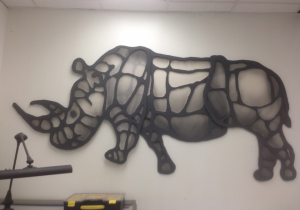
Jim expained, “We used our ShopBot 96 x 48 tool to create this rhino for an FSU production of James and the Giant Peach; it’s about 6 feet long.”
Jim noted that in the professional theatre world, a small percentage of set designers provide their work in hand drawings, which then need to be translated in to CAD to be readied for the production process; but about 70 to 80% of designers are working in Vectorworks, Sketchup or AutoCAD.
At FSU, Jim teaches the next generation of theatre designers and technicians. He works primarily with graduate students but also a handful of undergrads. “One of the key pieces of the training here is to encourage collaboration,” Jim said. ““In any given project, the scenic designer will draw all the scenic elements, and then provide the design files to a student technician to execute. The student who is going to cut the work on the ShopBot is asked to check and redraw the design files to ensure that they are ready for machining. You have to know every step of the process inside and out. By drafting everything in 3D, we know that our cuts on the CNC will be accurate.”
Jim commented that students coming up in this digital age have some tremendous advantages. “When you are working with CNC, you know that the design you draft is exactly what you will get. A student was recently working and re-working a 1/6th scale model of an antique chair for a production. He was able to prototype the piece quickly, rework the design as it was needed, and rapidly bring it to a stage where it’s ready to be cut full size.”
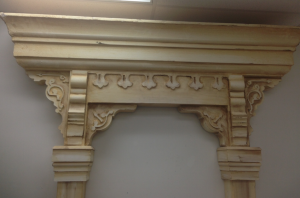
“The arch was used in a production of Summer and Smoke. It is made out of MDF and white pine, and the cornice is made from white bead foam we had custom cut. The curl detail was cut on the ShopBot.”
Jim said that working with ShopBot has been very positive. “Here at FSU, we’ve got a 96 x 48 tool that is about 10 years old,” Jim explained. “Randy Johnson came down and led a ShopBot Camp here about 2 years ago, during which he performed some needed maintenance work on the tool and provided us with some very useful operational tips.”
Jim continued, “We appreciate our relationship with ShopBot. Randy was on my panel last year at the USITT national conference. Thea Eck will be on my panel at the conference in March 2016 in Salt Lake City about rapid prototyping in theatre. Their knowledge and expertise is very valuable and they do a great job educating members of USITT about how CNC machines can change how we approach the construction process.”
Along with its basic training courses, ShopBot has been working on adding training sessions geared to the needs of specific applications. This led to the company’s participating at the USITT Master Classes at Playmakers Repertory Company. The group of theatre professionals who signed up for classes were at varying levels of CNC knowledge and practice, so ShopBot provided a ‘basic’ training as well as some more specialized training to those with more CNC experience.
If you’re interested in specialized CNC training, get in touch with ShopBot here. We’d be glad to put together a special program for your team.
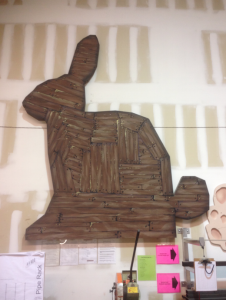
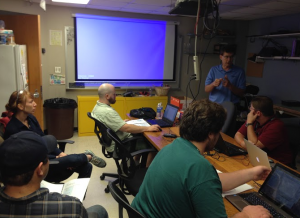
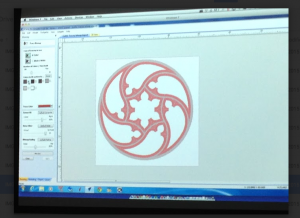
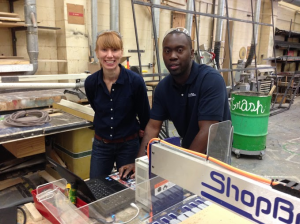
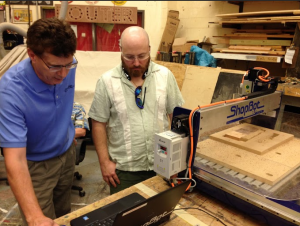
Leave a Reply